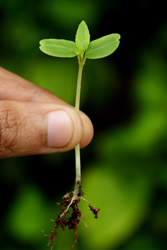Encouraging plant biodiversity from the ground up
Why some plants flourish while others falter has long puzzled scientists. This issue is highly relevant to recent efforts to preserve and promote biodiversity, and is therefore worthy of investigation. The challenge was taken up in the context of a project entitled 'Understanding soil microbially mediated mechanisms that influence plant species co-existence in natural communities' (Soilmicroplantdiver). EU funding was appropriated to support a collaborative effort between two leading academic institutions in Germany. The research team focused its attention underground, specifically on microbes in the soil acting upon the plant's root system. Fungi such as arbuscular mycorrhizas are beneficial, facilitating the uptake of nutrients and water, while other microbes are pathogenic and harm the plant. Experiments in a natural grassland site in Germany allowed the Soilmicroplantdiver scientists to get up close and personal with soil-plant interactions. They discovered that the distribution of communities of beneficial and pathogenic microbes strongly influences the composition of plant species in the vicinity. These results have been published in a peer-reviewed scientific journal and will be of value to policy-makers as well as conservationists.

